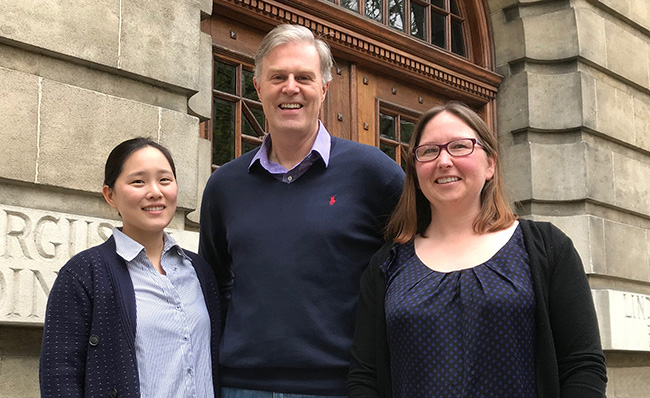 Friday 10 November 2017 12:49pm
Friday 10 November 2017 12:49pm
L-R: Dr Su Young Han, Prof Allan Herbison, Dr Jenny Clarkson.
Crucial new information about how the brain controls fertility has been unlocked by University of Otago researchers, with their findings just published in prestigious journal Proceedings of the National Academy of Sciences of the United States of America (PNAS).
Professor Allan Herbison, Director, Centre for Neuroendocrinology in Otago's Department of Physiology, says it is little known that the brain controls fertility, by first controlling the pituitary gland, which in turn controls the ovaries in females and testes in males.
“The brain does that by generating pulses of hormone secretion in the blood about once every hour, in both males and females, which then goes down and tells the ovary or the testis what to do. Since the discovery of pulsatile hormone secretion over 40 years ago one of the key challenges in this field has been to understand how the brain actually generates these pulses,” he says.
Professor Herbison and his principal co-authors Dr Jenny Clarkson and Dr Su Young Han have identified a group of about 2000 kisspeptin neurons in the brain's hypothalamus that synchronise their activity to generate the hormonal pulse, a discovery which has important implications for better understanding and manipulating fertility.
Women with polycystic ovarian syndrome (PCOS), affecting about 5% of all reproductively aged women, have pulses that occur too fast, often leaving them infertile. On the other hand, women who are not generating pulses of hormone or the pulses are too slow have a condition called hypothalamic amenorrhoea, also leaving them infertile.
“It turns out that these cells in the brain making kisspeptin are the pulse generator. So having identified them, this means that we can now go in and start manipulating kisspeptin receptors to control the pulses.”
Professor Herbison says while there are kisspeptin neurons in different places through the brain, it is the kisspeptin neurons in this particular part of the hypothalamus which, every hour or so, synchronise their activity and send out a signal that generates the pulse of hormone secretion.
"We don't yet know anything about how they actually manage to synchronise their activity, so that is where our research is heading. The more detail we can find about the mechanisms involved, the more chance we have of manipulating them to generate or stop synchronization."
The research has been described as a "landmark study" by Professor Stafford Lightman from the University of Bristol, UK. He is the President of the British Neuroscience Association and a world authority on how pulses of hormones are generated in the bloodstream.
“The site of the brain's pulse generator that controls the whole cascade of reproductive hormones essential for sexual function and fertility has been a holy grail of neuroendocrinologists for the last 40 years,” he says.
“This is a landmark study and opens the way to develop new therapeutic strategies to help regulate fertility in clinical medicine.”
Major funding for the study was provided by the Health Research Council of New Zealand (HRC). Chief Executive Professor Kathryn McPherson has welcomed the insights Professor Herbison and his colleagues have provided.
“This research shines a bit more light on how crucial our brains are for controlling all of our functioning – including fertility – something we tend to take for granted until it doesn't happen. It also highlights that our researchers must often spend years at the lab bench to drive forward new treatments in the real world.
“The HRC is delighted the research grant to Professor Herbison and team has produced fascinating insights to the brain's function and new opportunities to help people confronting fertility issues.”
For further information, contact:
Professor Allan Herbison
Email:
A list of Otago experts available for media comment is available elsewhere on this website.
Electronic addresses (including email accounts, instant messaging services, or telephone accounts) published on this page are for the sole purpose of contact with the individuals concerned, in their capacity as officers, employees or students of the University of Otago, or their respective organisation. Publication of any such electronic address is not to be taken as consent to receive unsolicited commercial electronic messages by the address holder.
